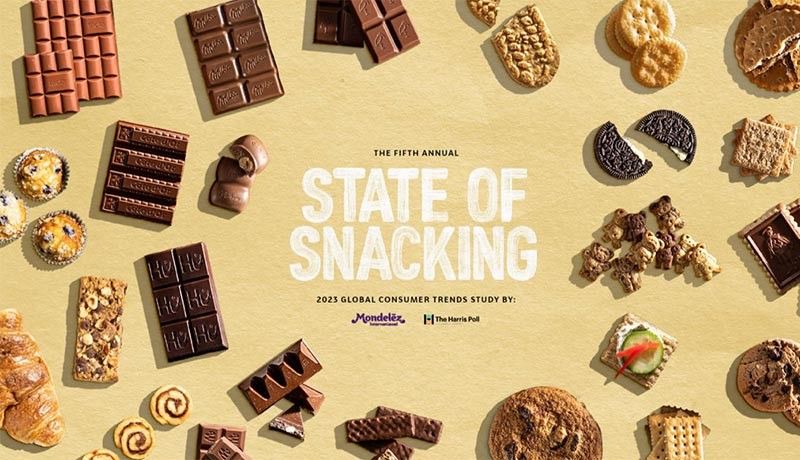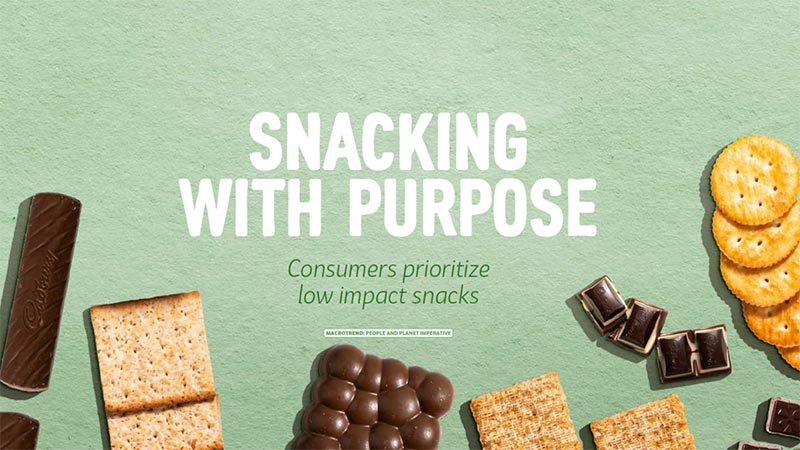What has changed in the snack habits of Filipinos? Discover in the State of Snacking report

CEBU, Philippines — Global snacking company Mondelez International has released the fifth edition of its State of Snacking report. According to the report, consumers are eating more small meals, snacking mindfully with attention and intention, staying loyal to their favorite snack brands, and choosing snacks made more sustainably.
In a panel discussion about the State of Snacking in the Philippines, experts confirm that Filipinos are being more mindful both for well-being and for the planet.
The State of Snacking is a global consumer trends study examining insights on how consumers make snacking decisions. The fifth annual report reveals global consumers are still snacking strong.
Developed in partnership with consumer polling specialist The Harris Poll, the report was launched five years ago in support of Mondelez International’s mission to lead the future of snacking. The past half-decade of tracking attitudes and behaviors among thousands of consumers across 12 countries has shown a consistent trendline of consumers demonstrating a preference for snacks over meals.

To understand how Filipinos are snacking these days, a panel discussion was facilitated by Mondelez International together with experts in the field of nutrition, well-being, snacking and sustainability. Here are some insights uncovered by the panel discussion:
6 out of 10 consumers prefer to eat many small meals throughout the day
In line with the last five years of data, consumers have continued to prefer snacks over traditional meals in 2023.
According to panelist Dr. Imelda Angeles-Agdeppa, a registered nutritionist-dietitian and the former Director of the Food and Nutrition Research Institute of the Department of Science and Technology (FNRI-DOST), “Eating smaller meals or larger meals depends on the lifestyle habits and health condition of a person. Research have shown that eating smaller meals frequently can help appease hunger, improve appetite control and can prevent overeating. Also, it helps us to digest better because we are putting small, manageable quantities of food into the body bit by bit rather than larger meals. It is easier for our gut to process and absorb vitamins and minerals from our foods when we eat smaller quantities more frequently. Moreover, it could also be greatly beneficial especially among those with specific health conditions like diabetes as it can help prevent the sudden spike of blood sugar.”

67% look for snacks that are portion controlled
Consumers are not just seeking satisfaction from their snacks; they are also looking for nutritional balance and appropriate portion balance. They are choosing snacks to align with their personal health and wellness goals more closely.
As shared by panelist Hector Maglalang, president of the Philippine Association of Nutrition (PAN), “If you look at the survey that shows the increasing number of people choosing portion control, I think that’s really good for their health. Because they determine what amount of food they need to consume. That is portion control—control what you eat. So, portion control is important for them to be nutritionally balanced, not only in eating but for overall well-being.”
76% have been loyal to certain snacks for a long time
Nostalgia also lies at the heart of the snacking experience. Three-quarters of global consumers report that they have been loyal to certain snacks or brands for a long time (76%). Meanwhile, seven in 10 global consumers (68%) often seek out snacks that evoke memories of childhood or past experience.
Speaking about their 61-year-long heritage of snacking in the Philippines, Mondelez International managing director Aleli Arcilla shares that apart from making delicious snacks, the company also promotes Mindful Snacking.
“This is our global advocacy to inspire consumers to eat with intention and attention. To help consumers relate to this advocacy more we also have translated it to Tagalog, which is “Snack na Swak.” It’s about being conscious of what it is you want to eat, why you’re eating and how it makes you feel. So, you don’t have to choose between snacking and eating right for the moment. We also help consumers to snack mindfully by offering portion control snacks, this means snacks that contain two hundred calories or less in every pack.”

74% typically recycle their snack packaging
Mondelez International’s focus on its sustainability goals goes hand in hand with the company’s well-being advocacy. A majority of consumers report they choose to buy snacks from brands that align with their values.
For example, 63% of consumers say they seek snacks that work to minimize their environmental impact with actions such as prioritizing local ingredients, optimizing supply chains or using carbon offsets to promote sustainability.
As shared by Philippine Alliance for Recycling and Materials Sustainability (PARMS) founding president Crispian Lao, “Are Filipinos aware that there is plastic recycling? Yes and no. I think this is an area where we can educate our consumers more. Coupled with education should be the infrastructure to collect, recover and bring it to the proper facilities so that plastic packaging does not end up as waste. So that we can turn them into resources. Now we see the drive of industries to educate their consumers, more importantly having drop-off points where used packaging can be brought. Giving the people avenues where they can drop off their waste is critical.”
To learn more about the State of Snacking, the report is published and available at Mondelez International’s website: www.mondelezinternational.com/stateofsnacking.
Editor’s Note: This press release is sponsored by Mondelez International. It is published by the Advertising Content Team that is independent from our Editorial Newsroom.
- Latest

























